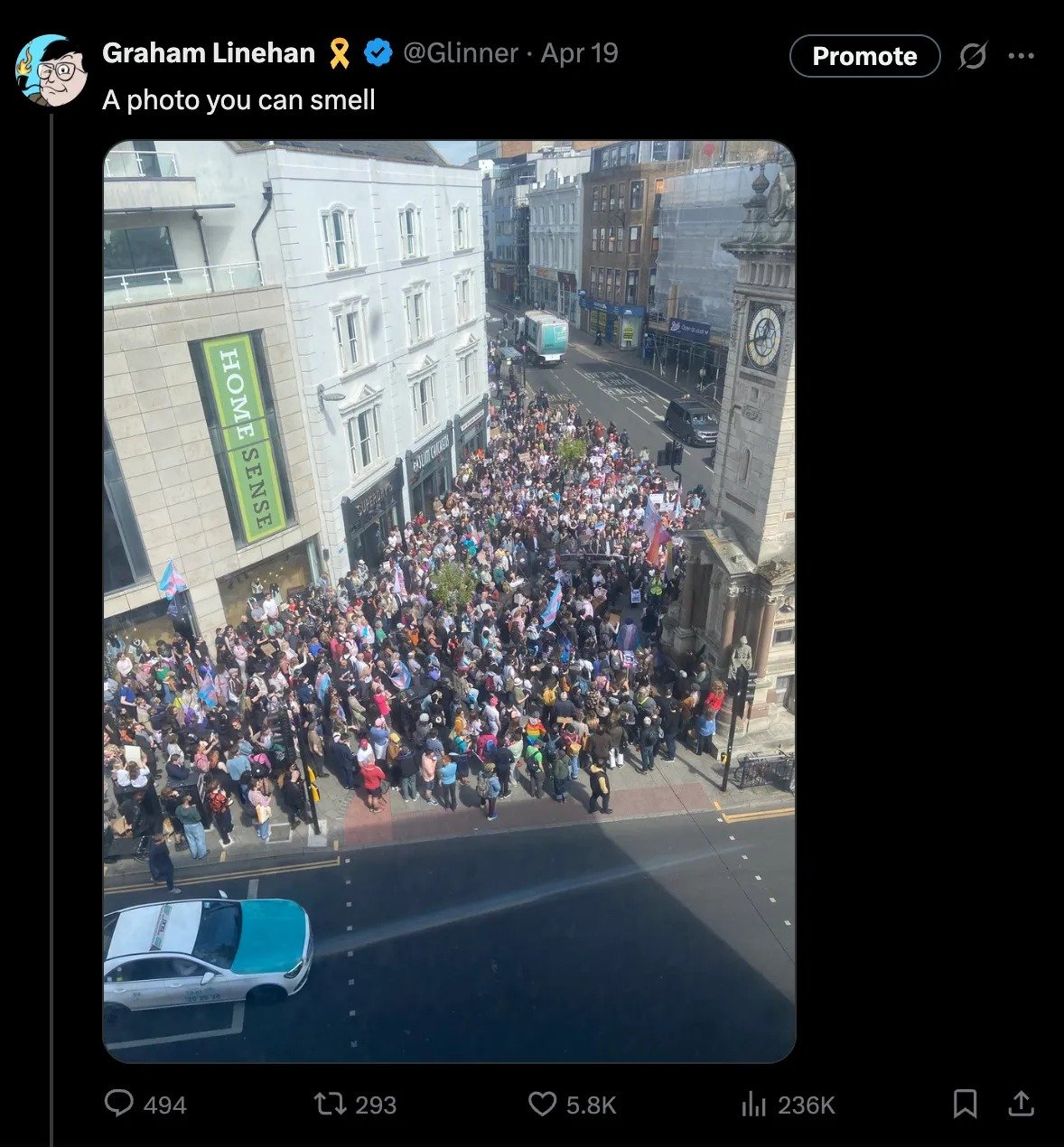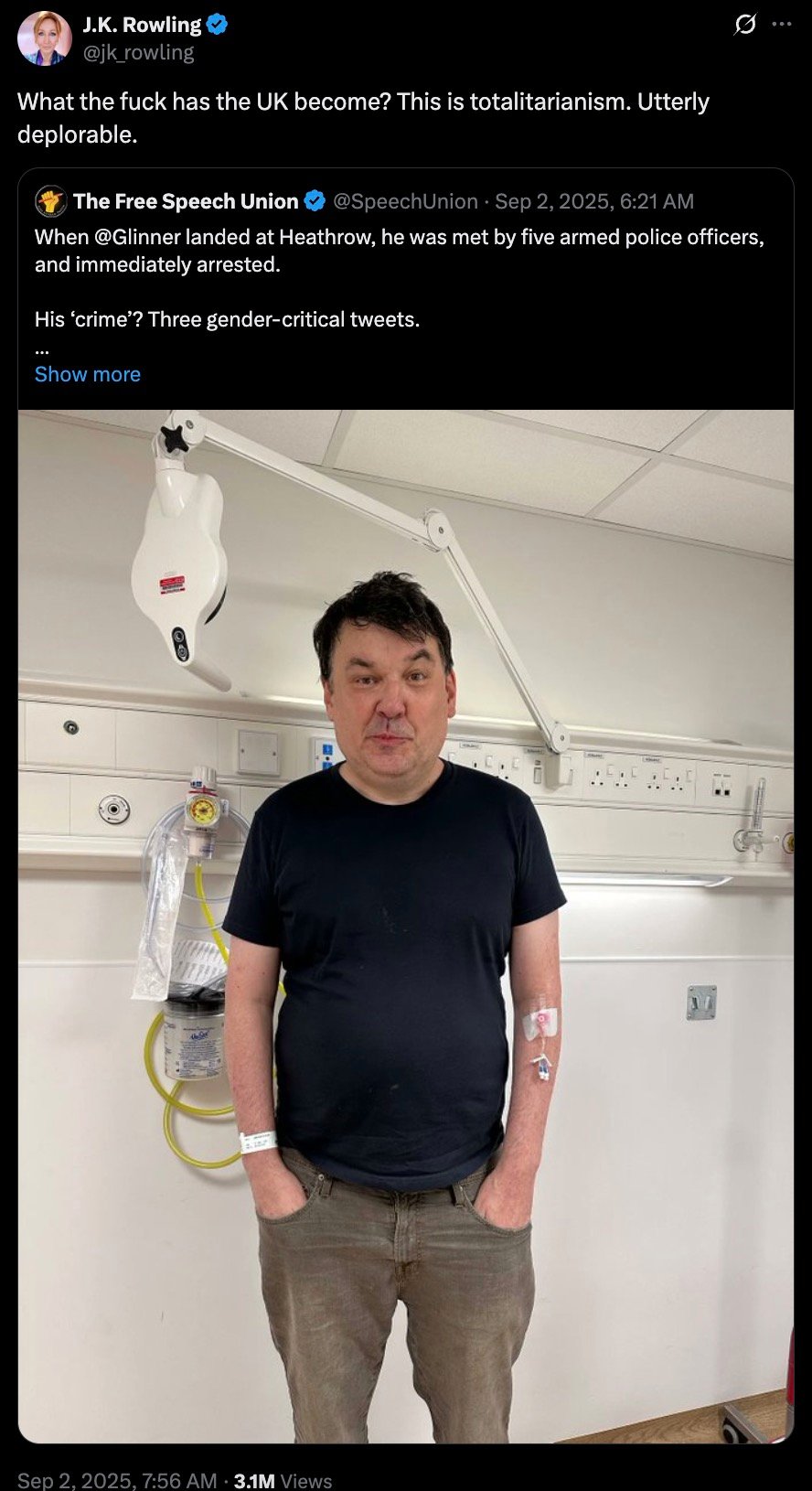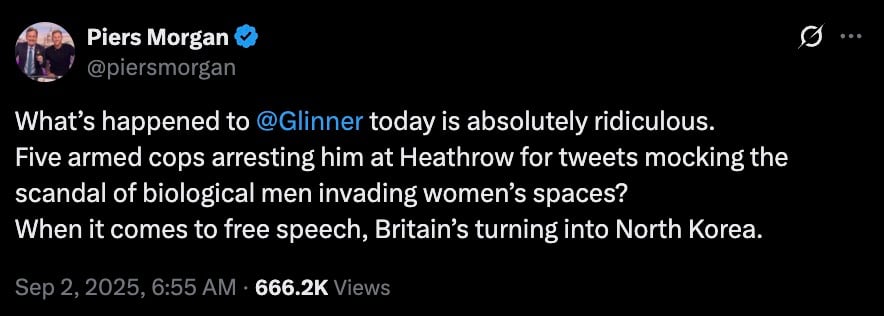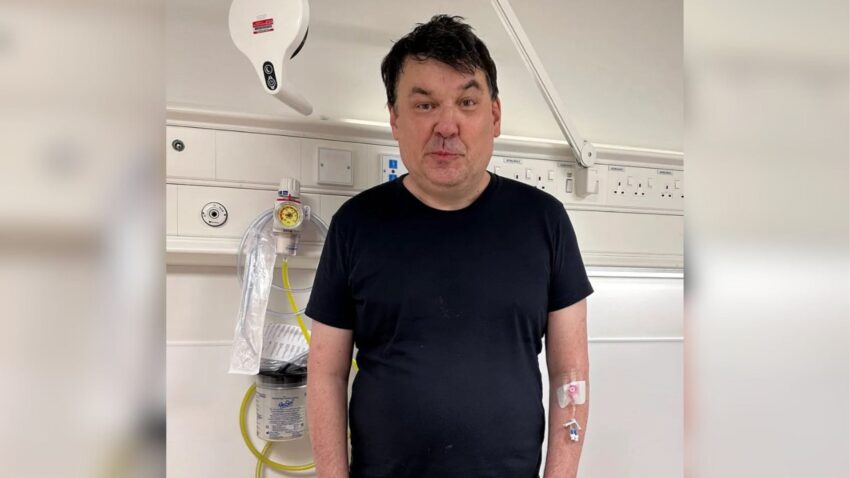If you’re tired of censorship and dystopian threats against civil liberties, subscribe to Reclaim The Net.
There are many ways to return to Britain after a long-haul flight. Maybe you get a cup of tea, a mildly annoyed customs agent, and a taxi driver who tells you London’s gone to hell. Or, if you’re Graham Linehan, you’re met at Heathrow by five armed officers who then take you into custody over things you wrote on the internet.
The man who created Father Ted and The IT Crowd, shows that helped define British humor, was arrested, detained, and taken to hospital, all because of three tweets.
He wrote later: “I was arrested at an airport like a terrorist, locked in a cell like a criminal, taken to hospital because the stress nearly killed me, and banned from speaking online.”
The Metropolitan Police confirmed that Linehan was arrested on suspicion of inciting violence, related to posts he made on X. Armed officers from the Met’s Aviation Unit escorted Linehan off of a flight from Arizona and into custody.
The tweets in question included one joke suggesting that if a “trans-identified male” is found in a women-only space, people should “make a scene, call the cops and if all else fails, punch him in the balls.”

Another tweet featured a photo of a transgender rally with the caption: “A photo you can smell.” A third read: “I hate them. Misogynists and homophobes. Fuck em.”


Linehan says he was taken to a holding cell, stripped of his belongings, and interrogated in detail about the tweets.
This isn’t satire. This is modern Britain.
At some point, Lineham’s blood pressure spiked high enough that he had to be taken to the hospital. Not exactly how most comedy writers picture the fallout of posting online.
He suspects the arrest wasn’t spur-of-the-moment. It was planned. Before he even left the US, something odd happened.
At the gate in Arizona, he says, airline staff told him his seat was suddenly unavailable and he needed to be rebooked.
At the time, he chalked it up to airline chaos. But later, reflecting on the timing, he wrote: “At the time, I thought it was just the sort of innocent snafu that makes air travel such a joy. But in hindsight, it was clear I’d been flagged.”
As for bail, it came with only one condition: he’s not allowed to use X.
Linehan has become a public enemy in some progressive circles and a hero in others.
For years, he’s spoken out against what he sees as the ideological overreach of gender activism.
In the process, he’s lost work, colleagues, and mainstream support.
Linehan’s arrest has, unsurprisingly, drawn criticism from those concerned about Britain’s increasingly twitchy attitude toward online speech.
Conservative MP Neil O’Brien called the incident “laughable if it wasn’t so serious,” adding, “Britain is now a total laughing stock—a country where we arrest the authors of light comedies and interrogate them about their tweets.”
Linehan expressed disbelief at the force mobilized against him, especially when contrasted with the UK’s handling of serious crime: “In a country where paedophiles escape sentencing, where knife crime is out of control, where women are assaulted and harassed every time they gather to speak, the state had mobilised five armed officers to arrest a comedy writer for this tweet… and no, I promise you, I am not making this up.”
Linehan said he initially laughed at the absurdity of the situation. “I couldn’t help myself. ‘Don’t tell me! You’ve been sent by trans activists.’”
While officers were professional, he noted they seemed confused by the political nature of the arrest. “Entirely professional and even kind, but most had absolutely no idea what any of this was about.”
Though during questioning, Linehan said officers took his posts literally, ignoring the satirical context. “I explained that the ‘punch’ tweet was a serious point made with a joke… certainly not a call to violence.” When the officer referred to “trans people,” Linehan challenged the phrasing. “‘Assigned at birth? Our sex isn’t assigned.’ He called it semantics, I told him he was using activist language.”
The stress of the arrest triggered a medical emergency. “Eventually, a nurse came to check on me and found my blood pressure was over 200—stroke territory. The stress of being arrested for jokes was literally threatening my life!”
Support for Linehan poured in almost immediately. JK Rowling, who has herself faced relentless backlash for her gender-critical positions, reacted to the news by writing: “What the fuck has the UK become? This is totalitarianism. Utterly deplorable.”

Others echoed her alarm. Elon Musk described Britain as a “police state.” Piers Morgan posted: “What’s happened to [Linehan] today is absolutely ridiculous. Five armed cops arresting him at Heathrow for tweets mocking the scandal of biological men invading women’s spaces? When it comes to free speech, Britain’s turning into North Korea.”

Robert Jenrick, the Shadow Justice Secretary, also condemned the operation, stating: “This is ridiculous and a complete waste of police time. The police only respond to 1 in 5 reported shoplifting offences, but deployed 5 armed officers to arrest a comedian over three tweets. We desperately need to end this nonsense and go after actual criminals.”
The Free Speech Union has stepped in, vowing to provide financial support for Linehan’s legal defense, which it described as a response to “preposterous allegations” and “a disproportionate response from the police.”
The UK is currently experiencing a free speech crisis and this is only the latest example. One of the starkest recent examples is Lucy Connolly. She was sentenced to 31 months in prison for a single social media post about the Southport killings.
Her case didn’t surprise anyone paying attention. What happened to her is now part of standard enforcement. British police units are actively integrated with online monitoring tools. These systems flag content without the need for a complaint, though Linehan suspects his arrest was prompted by a complaint.
Once flagged, police follow up with in-person visits, arrests, or digital bans. The state has built a process for regulating speech without having to say so directly.
This is the legal and operational environment created by the Online Safety Act. The law was passed in 2023 and came into force in 2024. It was announced as a protective measure focused on child safety. That framing has not held.
The Act gives regulators authority over any online content deemed harmful, even when it is not illegal. The language of the law is broad enough to allow intervention based on tone or framing.
Linehan’s arrest is not difficult to explain in the current legal context.
Linehan is facing police interviews, a court case, and a ban from using X. Connolly served a prison sentence. Foreign websites are entering litigation with British regulators. The pattern is already visible.
This used to be the kind of thing that happened elsewhere. It was the sort of legal system that British commentators once condemned on human rights grounds. But for Britons, it’s not a foreign problem anymore.
It’s happening at Heathrow, with five armed officers. And a man who once wrote some of the best modern British sitcoms is now being interrogated like a criminal for online posts.
If you’re tired of censorship and dystopian threats against civil liberties, subscribe to Reclaim The Net.
The post Graham Linehan Arrested by Armed Police Over X Posts as UK Free Speech Crisis Deepens appeared first on Reclaim The Net.
Click this link for the original source of this article.
Author: Cam Wakefield
This content is courtesy of, and owned and copyrighted by, https://reclaimthenet.org and its author. This content is made available by use of the public RSS feed offered by the host site and is used for educational purposes only. If you are the author or represent the host site and would like this content removed now and in the future, please contact USSANews.com using the email address in the Contact page found in the website menu.





